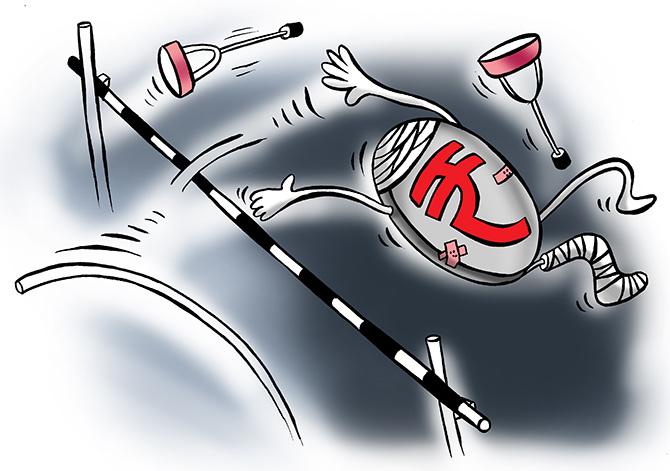While Governor Das was sanguine on government walking the fiscal prudence path--which was missed three out of the five budgets of the Modi government--Acharya pointed to the fiscal slippages as a worry.
Illustration: Uttam Ghosh/Rediff.com

Deputy governor Viral Acharya and his boss Shaktikanta Das seemed to be on completely different pages on the fiscal deficit front, with the departing technocrat flagging it as a concern and the governor underlining his optimism on the same, show the minutes of the last policy meeting.
While the career bureaucrat-turned-central banker Das was sanguine on government walking the fiscal prudence path--which was missed three out of the five budgets of the Modi government--Acharya, a trained economist who teaches the subject, pointed to the fiscal slippages as a worry.
As per the minutes released last week, Acharya acknowledged that the consolidated fiscal deficit of the Centre and the states has gone down since 2013, but flagged fiscal slippages amidst missing tax collection targets and falling growth rates as an upside risk to inflation estimates.
According to Acharya, this was primarily due to public sector borrowing requirements- which appropriately accounted for extra-budgetary resources and other off-balance sheet borrowings by the Centre and the states.
Public sector borrowings have now reached between 8 and 9 per cent of GDP, a level which was last seen in 2013, during the taper tantrums of the US Fed, Acharya argued, as per the minutes of the June 6 policy meeting wherein despite his concerns Acharya chose to go with the majority view to cut rate by 25 bps to a nine-year low level of 5.75 per cent.
But the minutes gave ample indication of his mind, which was not convinced with the arguments for the third successive rate cut.
And he took refuge in Ernest Hemingway's lines before going with the majority view of cutting the rates for the third time, displaying a rare quality.
Quoting Santiago the old fisherman in the novel, Acharya expressed his melancholy in voting with the majority: "It is better to be lucky. But I would rather be exact. Then when luck comes, you are ready."
Das on the other hand argued that several public sector units which have their own revenue streams to service their debt and thus can take care of their liabilities.
"Borrowings by public sector enterprises are mostly for capex. Hence, such borrowings should be viewed differently," the governor argued.
But Acharya explained that the rise in borrowings by public sector units reflect a "structural pattern" of greater government spending and not just cyclical such as due to weak tax collections from low growth.
"Correct economic measurement of the fiscal slippages should factor in the implications of rising public sector borrowings rather than rely solely on the consolidated fiscal deficit figures," Acharya argued.
Acharya said high public sector borrowing impairs monetary policy transmission due to the crowding-out effect on market financing through public bonds and on bank deposits through small savings which continue to offer rates that are significantly higher than market yields.
"This channel bites particularly when the domestic savings rate is on a decline and increases the economy's reliance on external sources of funding," he underlined.











 © 2025
© 2025